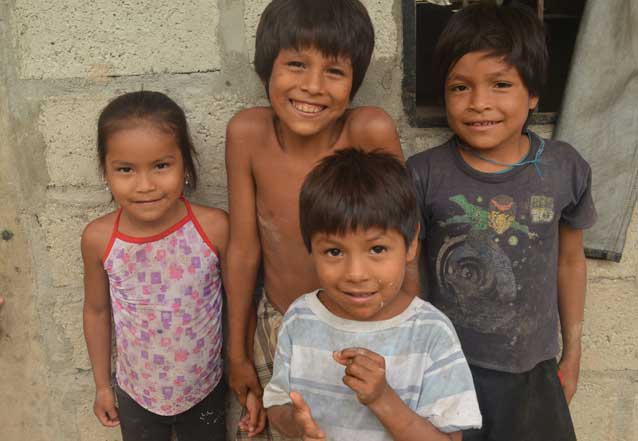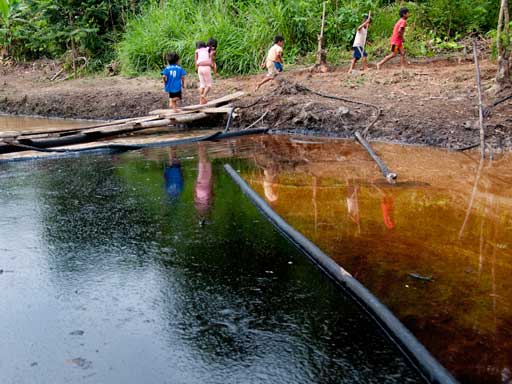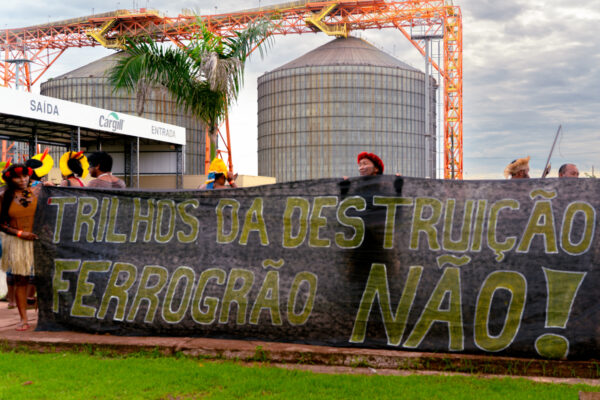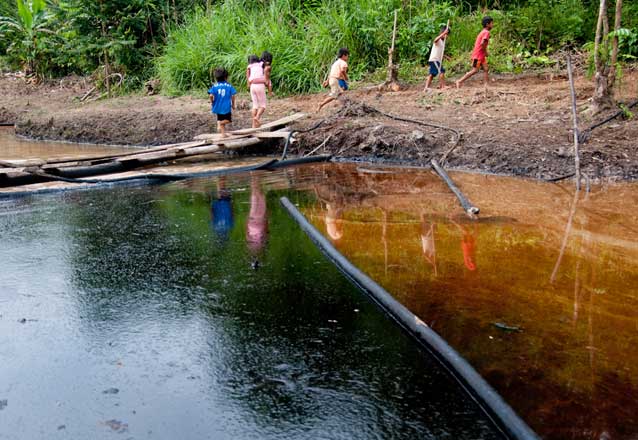
The reality of oil in the Ecuadorian Amazon is a series of contrasts: the fuel of the global economic engine pumped out from under a land of prehistoric forests and ancient cultures; the political rhetoric of development and national sovereignty alongside the reality of the highest poverty level in the country in the two biggest oil producing provinces and a soaring national debt to China; the promise of health care and education in a land plagued by contamination-related illnesses and illiteracy. Within this context sits Yasuní National Park, one of the world’s last great wildernesses, and next to it, the Kichwa community of Rumipamba, one of the indigenous communities most affected by oil extraction in the Ecuadorian Amazon. You cannot drink oil, you can’t breathe in its fumes, you cannot eat it, yet over and over you hear on the radio and see on the State propaganda billboards that line Amazonian oil roads the political catch-phrase in this region: “Oil brings life.”
On Wednesday, August 14, Ecuadorian president Rafael Correa officially announced the end of the much-touted Yasuni-ITT initiative, although its failure was considered pre-determined by many. I was in the community of Rumipamba visiting families with new ClearWater rain catchment systems when the announcement was made, so it wasn’t until I was back in the oil town of Lago Agrio on Friday that I heard the news.
I am sad to learn of the termination of this initiative, but what troubles me more is that it comes as no surprise to myself, nor to many people I know who work in the Ecuadorian Amazon. Yasuní-ITT was an initiative proposed in 2007 that gave wealthy nations six years to donate half of the $7.2 billion value of the estimated 846 million barrels of heavy crude, about 20% of Ecuador’s remaining oil reserves, sitting below Yasuní National Park. In return, the government would agree to leave the oil in the ground in this mega-biodiverse region. Of the $3.6 billion the government was asking for, only about $13 million in actual donations and $116 million in pledges were raised over the course of the past 6 years. In his announcement, Correa blamed the hypocrisy of wealthy nations for the failure of the initiative, saying that Western nations, the greatest emitters of greenhouse gases, failed to ‘put their money where their mouth is’ when it came down to protecting one of the last primary rainforests on Earth. I can’t say I entirely disagree with this statement, but the reasons for ITT’s failure also have a lot to do with the inherent flaws of the proposal and the Ecuadorian government’s paradoxical discourse when it comes to environmentalism and resource extraction.
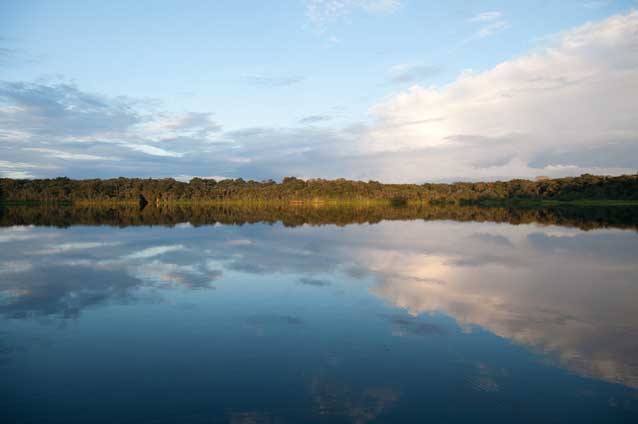
In many ways, Yasuní-ITT was doomed from the beginning by the world’s greed for oil and Ecuador’s economic dependence on that greed. Oil accounts for over 50% of the nation’s exports, and despite Correa being labeled the “green president”, he has done nothing but continue this trend. To understand ITT’s failure, one must look at the big picture of Yasuní. The ITT oil blocks to be spared from extraction – Ishpingo, Tambococha, Tiputini – are only a small part of Yasuní National Park, in itself a small part of the Yasuní Biosphere.
Within the park oil companies are already operating next door to the ITT blocks, the Spanish company Repsol in Block 16 and the State oil company Petroamazonas in Block 31. The Maxus Oil Company began operating in the park in the 1990s and the Via Maxus oil road, which runs 180km through Yasuní National Park, was built in 1993. In essence, the ITT proposal did not guarantee protection from oil extraction for the vast majority of the park, and many nations most likely saw through this. In addition, while the ITT initiative was under way, the Correa administration began to auction approximately 8 million hectares of primary forest in the southern Amazon to oil companies in what is known as the 11th Oil Round, and gave the green light to mega mining operations in the Cordillera del Condor along the southern border with Peru. It is hard for me to look at the now-defunct initiative and see anything but a green washing campaign designed to distract attention from the nation’s steady destruction of the rainforest.
The change in tone during Correa’s statement about the termination of the initiative was immediate. Despite vocally stressing the importance of the initiative for years, Correa spoke of the benefits of extracting oil from the blocks: the money it would generate for social programs, health care, and education. After all, this is a president who has been known to say, “Oil is life.”
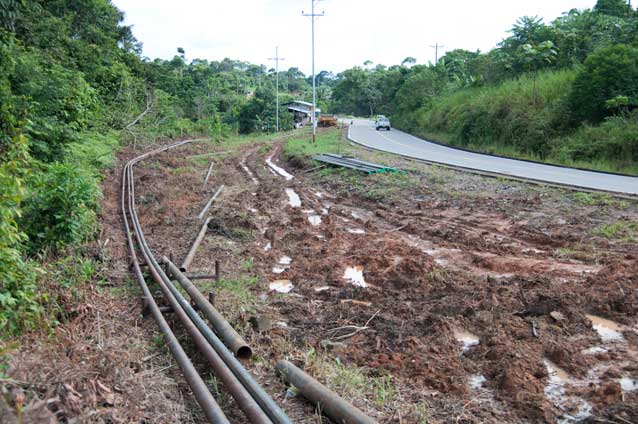
But enough with the political analysis. What is most upsetting to me about ITT’s failure are its implications for human life. It represents not only the Ecuadorian government, but the world-at-large’s unwillingness to recognize what oil extraction in a sensitive environment like the Amazon really means. It means a loss of land, food, and water for the indigenous peoples who have lived there for thousands of years and have an intimate connection with and dependence on the land. It also affects the rest of the people on Earth. The Ecuadorian government admits that exploiting oil in the ITT blocks would release 410 million metric tons of carbon dioxide into the atmosphere, bringing all of us ever closer to the veritable breaking point for the planet.
Within Yasuní live several groups of uncontacted peoples, the last in Ecuador. The Tagaeri and Taromenane live as semi-nomadic hunter-gatherers and require a vast territory in order to survive. Already, the pressures on their land caused by extractive industry have resulted in multiple instances of intense violence between the uncontacted peoples, Waorani indigenous communities, and workers. Article 57 of Ecuador’s own constitution prohibits extractivist operations in the intangible zone within Yasuní National Park for the protection of isolated peoples. Violation of this right is labeled ‘ethnocide’ by the constitution. Why then, we might ask, does Ecuador have to receive a sum of money to follow through on its own human rights commitments?
Spending time in Rumipamba gave me a first hand look at the harm that oil extraction can cause. The people there have suffered the devastating effects of negligent drilling for decades, first by Texaco and then by Petroecuador. Many of their homes literally sit on top of oil wells. Open pits are scattered across their community and crude flows from pipelines into the rivers and streams that they bathe in, that their children play in. I spent a few days with community member Fernando Alvarado, one of the first Kichwa to settle in Rumipamba over 30 years ago. He described the area when he first arrived as “puro monte“, or, “nothing but forest.” Looking at Rumipamba now it is hard to see any semblance of the Yasuní Biosphere it is located within. What changed this place? Oil. Ask anyone from Rumipamba if oil is life and they will tell you that for the people of the Amazon oil has only brought sickness and death.
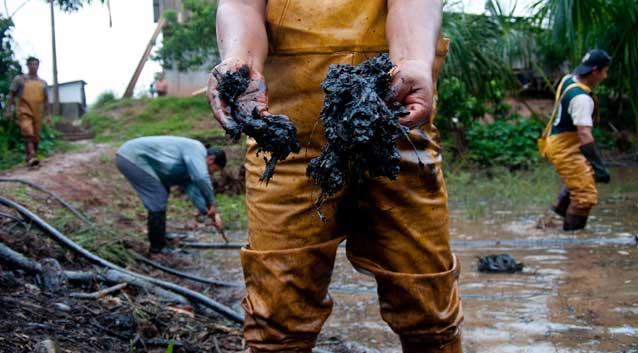
The bright side of this story is that, despite the heartache of watching an initiative
like Yasuní-ITT fail, knowing that oil companies will immediately begin moving into some of the last protected primary forest in the Amazon, home to the greatest array of biodiversity as well as some of the last uncontacted peoples on the planet, spending time in Rumipamba showed me people’s capacity for resilience in the face of hardship. The Kichwa of Rumipamba have been working tirelessly for the past few months to build 53 rain catchment systems, benefitting hundreds of men, women, and children who have had to drink toxic water for far too long. The positive impact of their hard work is evident in the faces of the community members who now have clean water available next to their homes. This strong and proud community now has something to show other than toxic waste pits and human suffering. They can show how their self-organizing and hard work has resulted in incredible positivity. The people of Rumipamba will tell you that water, not oil, is life.
Alex Goff is the International Field Coordinator for ClearWater, based out of Lago Agrio, Ecuador
